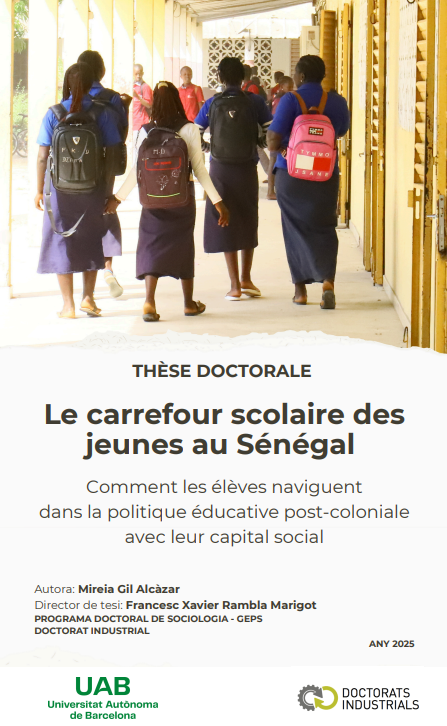Doctoral thesis defense of Mireia Gil
Le carrefour scolaire des jeunes au Sénégal: Comment les élèves naviguent dans la politique éducative post-coloniale avec leur capital social

This thesis analyzes the impact of Senegalese educational policies on the school trajectories of young people living in Pikine, a peripheral area of Dakar marked by a high dropout rate. It focuses on how these young people, often from disadvantaged backgrounds, mobilize their social and cultural capital to cope with the educational challenges tied to a school system still shaped by colonial legacies.
The research is situated within the broader context of educational reforms in Senegal, particularly through the PAQUET (Programme d’Appui à la Qualité de l’Équité et de la Transparence), launched in 2013. This program aims to improve access to quality education and reduce school dropout rates. Despite these efforts, disparities remain, especially in areas like Pikine, where socio-economic realities complicate young people's educational journeys.
The thesis is grounded in Bronfenbrenner’s ecological model (1979), which views youth development as shaped by multiple interconnected layers of environment: the microsystem (family, peers), the mesosystem (interactions between microsystems, such as family-school), the exosystem (local educational policies), and the macrosystem (cultural values, national and international politics). This framework is used to analyze how youth in Pikine navigate a context of inequality while trying to make sense of an educational system largely modeled on the French republican system, often seen as disconnected from their local culture and lived experiences.
A critical moment in these students’ paths is the preparation for the Brevet de Fin d’Études Moyennes (BFEM), a key exam for continuing their education. Many students must make significant decisions with limited resources, increasing the risk of school dropout. This is further exacerbated by teaching practices often perceived as inadequate—too theoretical and poorly connected to students’ real-life experiences—making it difficult for them to engage and fully grasp the curriculum.
The study also highlights the adaptation strategies young people develop. Despite limited means, they demonstrate resilience by relying on their social circles, networks, and community for the future. However, these aspirations, often shaped by global cultural influences, frequently clash with local constraints such as poverty, lack of opportunity, and a school system that remains distant from their daily lives.
Another central focus of the thesis is the impact of international education policies on Senegal’s school system. It critically examines how international donors and global organizations influence educational reforms. While these efforts aim to improve the system, they may also reinforce inequitable structures inherited from the colonial past, thus limiting the educational and social emancipation of youth in marginalized areas.
The chosen methodology is qualitative, focusing on the perspectives of key stakeholders. Between 2017 and 2022, interviews, field observations, and surveys were conducted with students, teachers, and other members of the educational community. These qualitative insights were triangulated with quantitative data to gain a deeper understanding of the complexity of school trajectories in Pikine. In addition, a literature review was carried out to examine how these organizations interact with political structures and the education system.
In conclusion, this thesis reveals the structural and contextual obstacles that hinder access to equitable education for youth in Pikine. It underscores how the inertia of the post-colonial system, social inequalities, and the limitations of educational reforms shape their academic and professional trajectories, while also demonstrating their capacity to resist and develop strategies for success despite an unfavorable environment.
Date: 22/07/2025
Hour: 11h
Sala de Graus en Fac. Economia